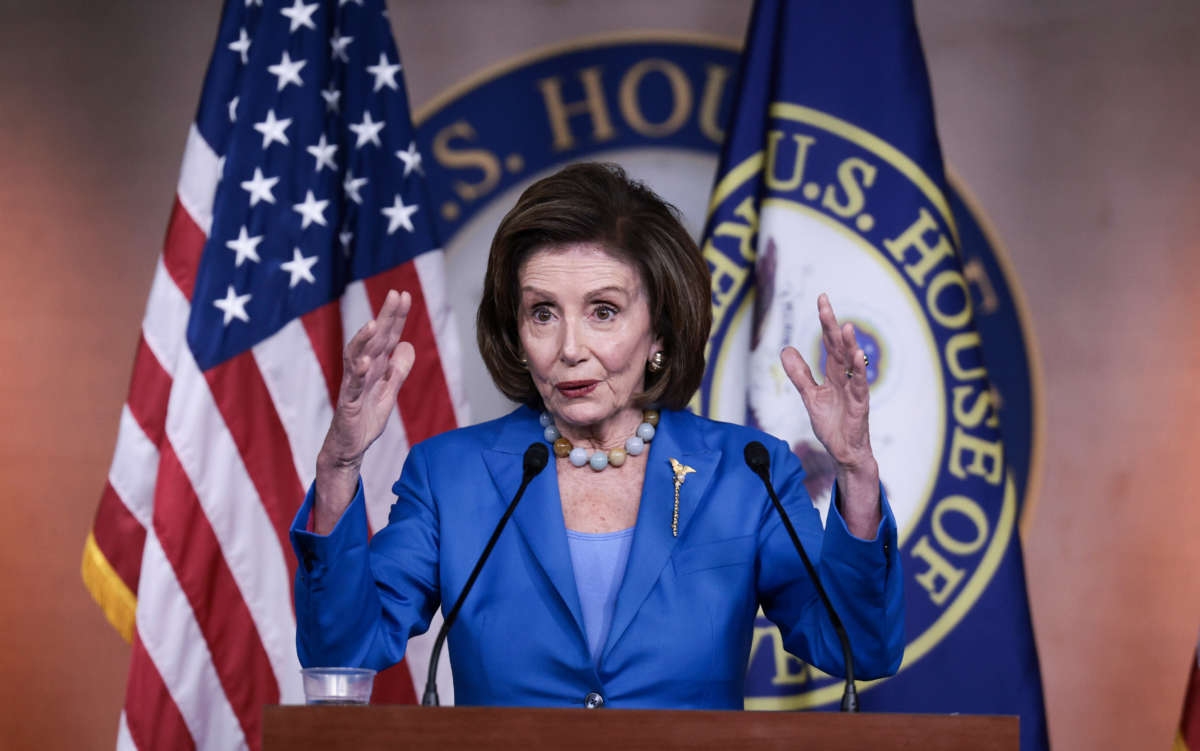As progressives fight to maintain climate and social programs in the Build Back Better Act, House Speaker Nancy Pelosi (D-California) is indicating that the price tag of $3.5 trillion over ten years will have to shrink, forecasting another fight ahead: what to cut from the bill.
As conservative Democrats force the caucus to bend to their will, the bill may be facing $1 trillion or even $2 trillion worth of cuts. In a press release on Monday, Pelosi said that she believes entire programs will have to be cut from the bill. “Overwhelmingly, the guidance I am receiving from Members is to do fewer things well,” she wrote in a Dear Colleague statement.
Pelosi may not be committed to that position, however. On Tuesday, CNN’s Manu Raju reported that Pelosi suggested the caucus may look at shortening programs instead.
This is the position that progressives in the House are taking. In the case that the bill does have to shrink, progressives are saying that they would rather shorten the timeline for implementation and have programs expire earlier in the decade than the bill currently calls for — presumably then putting them to a vote again when they expire. According to Politico, President Joe Biden is also open to this idea.
On Tuesday, progressive lawmakers emphasized the importance of retaining all of the proposals in the bill. “We can’t leave working people, families, and our communities behind. We can’t leave childcare, paid leave, health care, housing, climate action, education, and a roadmap to citizenship behind. We can’t leave President Biden’s necessary agenda behind,” wrote Rep. Pramila Jayapal (D-Washington).
“Our mandate right now: deliver change for working families, and don’t leave anyone behind. That can’t be accomplished if we pit programs or communities against each other. We must not be forced into housing vs. climate, or child care vs. elder care,” wrote the Congressional Progressive Caucus on Twitter, in response to Pelosi’s potential heel turn. “This is the right approach.”
Conservative Democrats in the caucus are indeed pitting programs against each other. Last week, in lieu of telling the public and Congress which proposals he wants to cut from the bill, Sen. Joe Manchin (D-West Virginia) told progressives that they must choose one of three family-related proposals: the child tax credit extension, paid family leave or child care funding.
Conservative Democrats have also been demonstrating a willingness to cut programs with little regard for the consequences. Sen. Kyrsten Sinema (D-Arizona) is reportedly saying that she wants to cut $100 billion worth of climate proposals from the bill, even as the nation faces a potentially record-breaking year in terms of climate disasters. The reconciliation package is the only major contemporary climate bill that could pass Congress.
In a progressive caucus call on Tuesday, Sen. Bernie Sanders (I-Vermont) emphasized that the cuts will represent an even bigger compromise than the one that progressives have already made. Noting that the current price tag — $3.5 trillion over a decade — was already a compromise, “we are not going to negotiate with ourselves,” Sanders said.
He called on Sinema and Manchin to be more specific about their demands for the bill, and has recently voiced frustration that the two senators are blocking the rest of the Democratic caucus’s desires in the Senate. “Is there a possibility — a horrible possibility, which would be so terrible for this country — that because two people refuse to do what 96 percent of the caucus wants, that nothing will happen? There is that possibility,” he said in a press conference on Friday.
Progressive lawmakers have pointed out that many of the bill’s biggest selling points are popular among the public. They say this lends credence to the idea that the bill is good optics for the Democratic Party, which early projections show will face a tough midterm election in 2022. Highlighting the polling numbers, Sanders wrote, “Good policy is good politics. Let’s do it.”
Here’s an example of where the progressives vs. moderates frame doesn’t cut it. If 83% of Americans favor an idea, is it “moderate” to oppose it? If ~95% of lawmakers in a party support that idea and a few don’t, are the latter seeking common ground or preventing it? https://t.co/FOTsRNeYjc
— Sahil Kapur (@sahilkapur) October 12, 2021
Some policy experts have cast doubt on the idea that allowing the programs to expire earlier would be effective for progressives, since allowing the programs to expire could endanger people who may rely on the financial assistance. Progressive lawmakers may be hedging their bets that programs like paid family leave and child care spending would be popular enough that they could pass through Congress easily when they come up for a vote later.
Meanwhile, some analyses indicate that choosing one program over another may end up causing more harm than good. On Tuesday, NBC reported that if Congress only implements universal pre-kindergarten and not child care spending — as Manchin reportedly wants to do — it could actually drive up prices for private day care, causing competition and potentially squeezing some smaller daycares out of business.
Join us in defending the truth before it’s too late
The future of independent journalism is uncertain, and the consequences of losing it are too grave to ignore. To ensure Truthout remains safe, strong, and free, we need to raise $46,000 in the next 7 days. Every dollar raised goes directly toward the costs of producing news you can trust.
Please give what you can — because by supporting us with a tax-deductible donation, you’re not just preserving a source of news, you’re helping to safeguard what’s left of our democracy.
